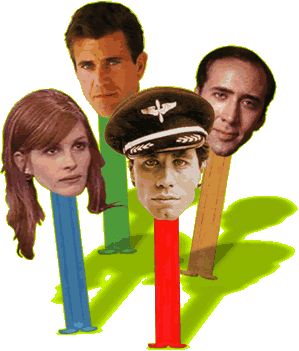
I've started to use "bringing out the dead," the title of the new Scorcese flick starring Nicolas Cage, as slang for "releasing a movie with a $20 million actor in it." We're all used to a Hollywood in which more is less. Higher production values translate into lesser cinematic value, and the overpaid-actor phenomenon follows the same rule: The more you pay actors, the less they actually act.
If you endured Julia Roberts in Notting Hill and Runaway Bride,Mel Gibson in Payback, John Travolta in A Civil Action, and Nicolas Cage in anything he's been in since 1994, you may have found yourself mouthing the words of that kid in The Sixth Sense: "I see dead people." That's right: on-screen corpses who phone in their non-performances and spend more time contemplating their next Learjet upgrade than getting into character. Most actors retire to their trailers during shooting breaks, but not the eight-figure crowd: They retire to the set in between trailer breaks.
What's paradoxical is that many of these actors made it to the top by playing complex, morally ambiguous, meaty characters, but once they enter the multimillionaires' circle they immediately adopt a vegan-like diet of shallow roles as tough-but-goodhearted cops, conscience-stricken lawyers, runaway brides, and other chimerical entities.
Take Nicolas Cage. He won an Oscar playing a doomed alcoholic in the depressive indie flick Leaving Las Vegas, only to parley this clout into "movies where things blow up" like Con Air and The Rock or "lovable cop" movies like Snake Eyes. Cage's obsession with good guy roles has become a pathology: Not only did he modify the script of his upcoming car chase movie Gone in 60 Seconds to make his character seem more "sympathetic," but his infatuation with playing Superman led celebrity-friendly Entertainment Weekly to chide him: "Forget Superman. Just play a real man." Even Sean Penn jumped into the fray: After visiting Cage on the set of Bringing Out the Dead, Penn told the press that Cage is "not an actor anymore."
No one is more caught in the "permanent hero" trap than Mel Gibson. Just to prove it to yourself, rent Mrs. Soffel (1984) and take a gander at Mel's fiery performance as a wanton and amoral escaped convict. Now flash-forward to today's Mel Gibson, and all you see is a guy with an expression that says "I need more coffee." I mean, I have Pez dispensers that seem more multidimensional than any character Mel has played recently.
In his hit film Payback, Mel (who was both producer and star of the film) had to replace director Brian Helgeland, who wouldn't abide by Mel's requests to make his mercenary mobster character seem more likable. Although actors hate it when fans mistake them for their on-screen personas, Mel seems to have similar problems distinguishing between his reel and real life. "One always has in mind an image that one wants to project, particularly in this business," Mel revealed to Premiere magazine referring to the white-washing of his character in Payback. "You can't escape that."
Actually, maybe Mel could escape it if it weren't for his strange amalgam of cowardice, arrogance, and egomania. I know Mel must feel that movie fans are dim-witted and slow to comprehend things, but I think most of us understand that if you play a bad guy on the silver screen, that doesn't mean you've become a bad guy in real life. After all, it's not as if every legendary actor had to become a human smiley-face in order to ensure career longevity. Back in the '40s Humphrey Bogart could have remained on the Casablanca track and played good-natured everyday heroes for the rest of his career, but he never shied away from being cast as the heavy. Why? Because 1) Unlike Mel Gibson, he didn't have an insultingly low estimation of the public's intelligence; and 2) He was an actor, not a publicist.
Of course, the calculus is a little different for actresses. While $20 million men seem to gravitate toward shallow, low-maintenance, cartoonish roles, women tend to be forced into them for lack of other options. After all, there are only a couple of fully fleshed-out roles for women per year, and Susan Sarandon usually gets them. Other actresses who have tried to buck the bimbo/sex vixen/America's sweetheart track, like Debra Winger, Holly Hunter, and Jessica Lange, usually end up marginalized. Julia Roberts' career is a case in point: She hit the big time with Pretty Woman, then tried to cross the genre divide by starring in off-kilter horror films like Mary Reilly -- which no one went to see. Now Julia's back on top, the first woman to enter the $20 million club, but only because she slotted herself back into the romantic-comedy drawer.
But before you start getting misty over what Hollywood's done to Julia, just remember: It's a bit misguided to feel sorry for someone who makes more in six weeks than you'll make in your lifetime.
Peter Braunstein writes about film and pop culture for the Village Voice, and is currently co-editing an anthology on the 1960s counterculture.
Peter's column runs every other Wednesday on GettingIt.
